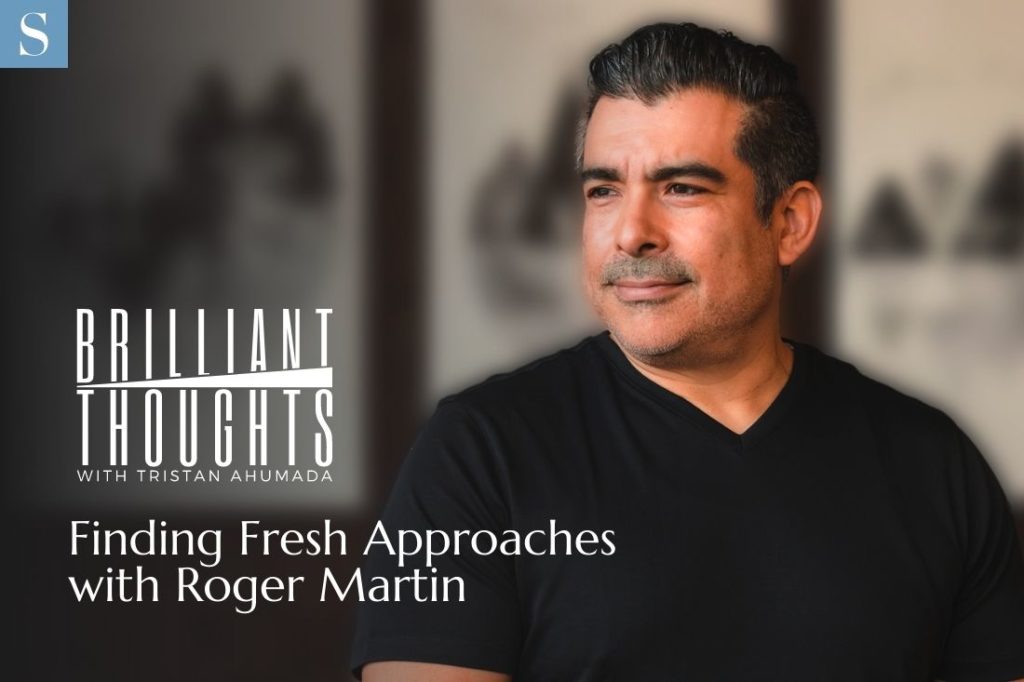You may have heard that the smartest people will say “I don’t know” a lot. One plausible explanation is that they realize that the answers to many questions are impossible to know for sure. That attitude may seem self-defeating to some, but to Roger Martin, business innovator and professor emeritus at Toronto University, it has distinct advantages.
“Why come to the conclusion that the way we’re thinking about this business problem is right,” he poses to Brilliant Thoughts’ host Tristan Ahumada. “And you must use that way, when there is lurking out there a better way… a newer way to think about it?”
When you believe an answer to be unequivocally true, you are closed off to possibilities. In his most recent book, A New Way to Think, Martin explores how this narrow mindset limits a person’s ability to create new solutions for business problems. He delves into falsification, a way of thinking that says there are no right answers—just better ones and worse ones.
Make innovation a habit.
Entrepreneurs don’t become successful by maintaining the status quo; they find new, better ways to solve problems. To differentiate themselves from the competition, they need to move away from the expected process. Unfortunately, that isn’t a message that most business people receive in school or at work.
“I think we often were taught to think about the artifact… about financial statements… about how much shareholder value we’ll produce… about what the product should look like,” says Martin. “We’re taught a heck of a lot less in the world of business about how you actually get stuff done, how you make stuff happen.”
If you want to change the world, you have to address your deep-seated habits, the automatic responses that your subconscious mind feeds you. Martin says that through deeply ingrained routines, the subconscious mind drives us to maintain tried-and-true methods of action instead of exploring new, potentially risky ones. The solution? Make a habit of innovating.
As you might imagine, training your mind to innovate isn’t always easy—it can be extremely uncomfortable at first. Anything that is exceptional is harder to implement because the subconscious questions the action so strongly: Why are we trying something new when we already know what works? That’s why it’s so important to believe you may not have all the best answers; there may be better ones.
Stay in constant motion.
“Disruption happens wildly disproportionately to people who are not moving forward,” explains Martin. What he means by this is that companies who fail to constantly reimagine their products will be targeted by disrupters. However, it’s much harder for disrupters to hit a moving target, or a company that is never complacent.
Imagine you want to break Procter & Gamble’s hold on the detergent industry by making a product that rivals their liquid Tide. You successfully create a new liquid detergent that works better and is cheaper, and it has real potential to siphon off a lot of their business. But then they announce a new liquid-free detergent that comes in pods, and all of a sudden your product is basically obsolete.
“My argument to all companies is to be in motion,” Martin explains. “And if you’re in motion, chances are, you’re not going to have a clear kind of disruption happening.”
Even though Procter & Gamble already had a wildly successful product, they didn’t stop innovating, which is exactly why the disruption didn’t work. Conversely, that’s also why would-be disrupters should target companies who consistently maintain the status quo, rarely revisiting their process.
Destroy the model.
Whether you’re defending a business or trying to subvert it, you need to question the currently used models. Although you can use an existing model as a foundation to build upon, Martin says there’s another way that may be even more effective.
“I always ask the question, ‘Is there a different model of meeting the customers’ needs?’” says Martin. “And, you know, I think there often is because… those who are prospering from the model are often very reluctant to destroy the model.”
Ahumada suggests TikTok and Tesla are good examples of breaking the model, to which Martin absolutely agrees. He says the key is to refuse to play the existing company’s game. Another benefit of choosing to start over rather than improve an existing model is that the subconscious isn’t screaming to keep things the same because you’re doing an entirely new thing.
Lead with ethos, logos and pathos.
“This great book that almost nobody reads is The Art of Rhetoric, and it says… in order to create something new, be innovative, create something that doesn’t now exist, you have to be persuasive, you have to imagine that possibility,” says Martin. “And then make the argument compelling enough to cause you to shift from what you’re doing now to this new thing.”
The book he’s referring to is by Aristotle, a philosopher from whom Martin has gleaned many critical lessons. Among them is the idea that leaders need to harness ethos, logos and pathos in order to find success. Those three qualities will ultimately drive an entrepreneur’s ability to generate truly original ideas and bring them to fruition.
He defines ethos as having the character that allows people to see you as credible and authentic and logos as the logical structure of an argument that allows you to be persuasive. Lastly, Martin says that pathos is the capacity to empathize with an audience, which is necessary if you want to have a large-scale effect.
“You’ve got to understand the audience enough to be able to figure out what argument would be persuasive to them… and to have the sense of credibility and authenticity,” argues Martin. All three are essential qualities if a leader wants to be innovating, moving forward and reimagining the machine.
Find Martin’s latest books, speaking engagements and words of wisdom when you visit his website, rogerlmartin.com.
Brilliant Thoughts with Tristan Ahumada is no longer releasing new episodes on the SUCCESS Podcast Network, but you can still listen to the full conversation below.





